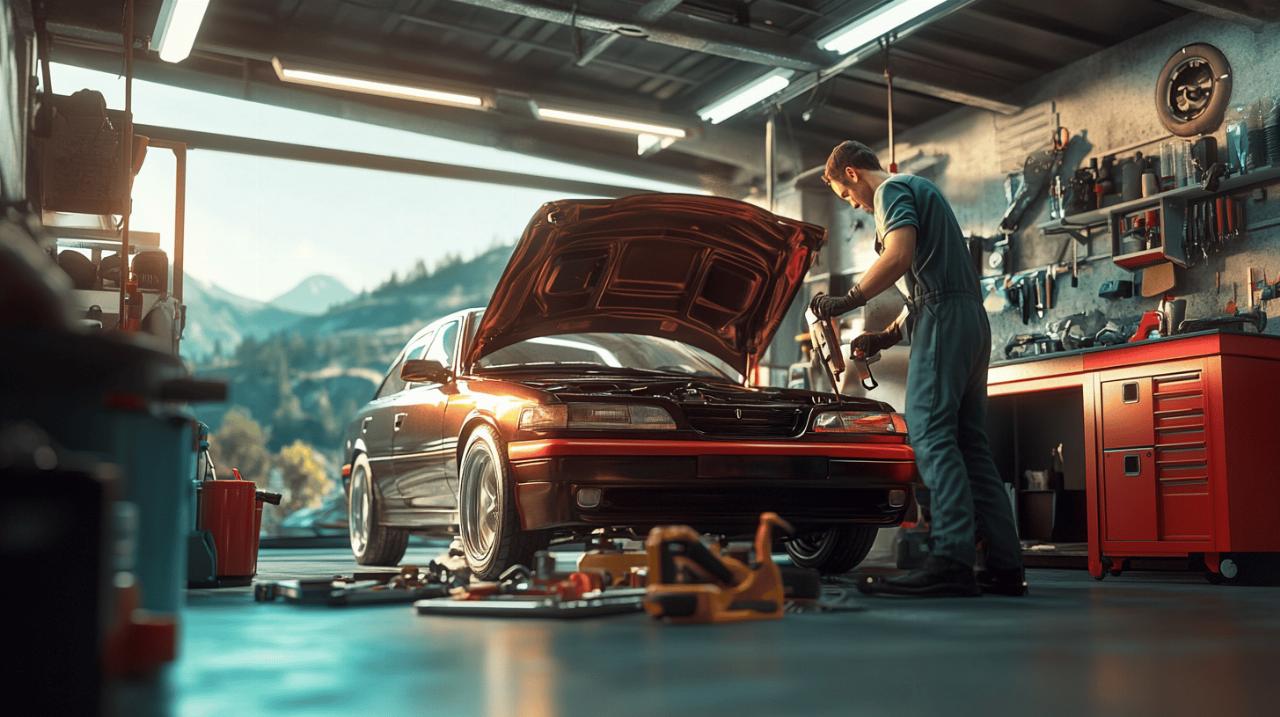Top Tips for Effective Vehicle Maintenance and Repair

Keeping your vehicle in top condition is an essential responsibility for every driver. Regular maintenance not only ensures safety on the road but also extends the lifespan of your vehicle and helps avoid costly repairs down the line. This comprehensive guide will walk you through the most important aspects of vehicle care, from routine checks to finding the right professional help.
Regular servicing and preventative maintenance
According to recent surveys, only 19% of drivers always check if their car is 'road-ready' before setting out on a journey. This startling statistic, highlighted by Motor Publish in their comprehensive vehicle care reports, demonstrates how preventative maintenance remains an overlooked aspect of car ownership. Establishing a consistent maintenance routine is the cornerstone of responsible vehicle ownership and can save you thousands in the long run.
Following manufacturer recommendations
Vehicle manufacturers create specific maintenance schedules based on extensive testing and design specifications. These aren't arbitrary suggestions but carefully calculated intervals that ensure optimal performance. Your owner's manual contains detailed information about when to change oils, filters, belts, and other components. Modern vehicles may have different requirements than older models, with some newer cars recommending oil changes between 5,000 and 10,000 miles rather than the traditional 3,000-mile interval.
Creating a maintenance schedule
Developing a personalised maintenance calendar based on your manufacturer's recommendations helps ensure nothing gets overlooked. Consider categorising tasks into monthly checks, quarterly services, and annual inspections. Monthly checks should include monitoring tyre pressure, engine oil levels, and coolant. The FORCES acronym serves as a helpful reminder for key checks: Fuel, Oil, Rubber, Coolant, Electrics, and Screen wash. Some experts also suggest the alternative FLOWER system: Fuel, Lights, Oil, Water, Electrics, and Rubber.
Quality parts and fluids matter
When it comes to maintaining your vehicle, the quality of components and fluids you use makes a significant difference to both performance and longevity. Cutting corners on these essentials often leads to more significant problems and expenses down the road.
Identifying genuine components
Authentic parts are designed specifically for your vehicle model, ensuring proper fit and function. When replacing components such as air filters, which should be changed approximately every 12 months or 12,000 miles, or spark plugs, which typically need replacement every 30,000 miles, genuine parts provide reliability that aftermarket alternatives may not match. For diesel vehicles, glow plugs are another critical component, with surveys showing that over 65% of drivers have had them replaced recently.
The false economy of cheap alternatives
While budget-friendly alternatives might seem attractive initially, they often result in more frequent replacements and potential damage to other vehicle systems. Quality engine oil, for instance, properly lubricates engine components and removes contaminants, directly affecting engine performance and longevity. Similarly, using the correct grade and type of transmission fluid, brake fluid, and coolant is essential for the proper functioning of these critical systems. The small premium paid for quality fluids and parts typically yields significant returns through improved performance and reduced repair frequency.
Building a Relationship with a Trusted Mechanic
Finding a reliable service provider is invaluable for maintaining your vehicle properly. A good mechanic becomes a partner in keeping your car running smoothly and safely for years to come.
What to Look for in a Good Garage
When selecting a service provider, look for workshops with qualified technicians, proper certifications, and transparent pricing practices. AA approved garages, for example, offer parts and labour guarantees for one year or up to 12,000 miles, providing peace of mind. Consider facilities that specialise in your specific make and model, as they will have the appropriate diagnostic equipment and expertise. A reputable garage should be willing to explain issues clearly and provide detailed estimates before proceeding with work.
Communication and Trust with Your Service Provider
Effective communication with your mechanic ensures you understand what maintenance is necessary and why. A trustworthy service provider will prioritise essential repairs without recommending unnecessary work. They should be willing to show you worn or damaged parts they've replaced and explain how preventative maintenance can avoid similar issues in the future. Building this relationship over time leads to more personalised service, as your mechanic becomes familiar with your vehicle's history and specific needs.
Tyre care and safety
Tyres are your only contact point with the road, making them one of the most critical safety components of your vehicle. Proper tyre maintenance affects everything from handling and braking to fuel efficiency and comfort.
Pressure checks and rotation practices
Tyre pressure should be checked at least every two weeks and before long journeys. Incorrect pressure leads to uneven wear, reduced fuel efficiency, and compromised handling. The recommended pressure for your vehicle can be found in the owner's manual or on a sticker typically located on the driver's door jamb. Regular rotation of tyres, usually every 6,000 to 8,000 miles, helps ensure even wear and extends their lifespan. This simple maintenance task can significantly improve vehicle handling and prevent premature replacement.
Understanding tread depth and wear patterns
The legal minimum tread depth in the UK is 1.6mm across the central three-quarters of the tyre width, but experts recommend maintaining at least 3mm, especially during winter months. Wear patterns can indicate alignment issues; even wear across the tread is ideal, while wear on only one edge suggests alignment problems. Weather conditions significantly impact tyre performance, with winter tyres providing better grip in cold and snowy conditions. Some drivers opt for all-season tyres as a compromise, though these may not perform optimally in extreme conditions.
Fluid levels and their significance
Your vehicle relies on various fluids to operate correctly, each serving a specific and crucial function. Regular monitoring and maintenance of these fluids are essential for optimal performance and longevity.
Essential fluids to monitor
Engine oil is perhaps the most critical fluid, requiring checks at least monthly and changes according to your manufacturer's schedule. Coolant prevents your engine from overheating and should be checked regularly, with a complete flush according to maintenance schedules. Brake fluid ensures your braking system works effectively; low levels can indicate leaks or worn brake pads. Power steering fluid, transmission fluid, and windscreen washer fluid also require regular monitoring. Each of these fluids has specific characteristics and requirements, so consult your owner's manual for the correct types and change intervals.
Signs your vehicle needs a top-up
Various warning signs indicate fluid issues. Dashboard warning lights are the most obvious indicators, but there are other symptoms to watch for. Grinding noises when braking often signal low brake fluid or worn pads. Difficulty steering could indicate low power steering fluid. An overheating engine might suggest low coolant levels. Strange smells, particularly sweet odours, can indicate coolant leaks, while burnt smells might signal transmission fluid issues. Checking fluid levels monthly helps catch problems before they lead to significant damage or safety concerns.
Recognising warning signs
Vehicles often provide clear signals when something isn't right. Learning to recognise and respond to these warning signs can prevent minor issues from developing into major problems.
Unusual sounds and what they mean
Different sounds can indicate specific issues. A squealing sound when starting the car might indicate a worn serpentine belt, which should be inspected for cracks and replaced if damaged. Grinding noises during braking suggest worn brake pads needing immediate attention. Clicking noises when turning could indicate CV joint problems, while knocking sounds from the engine might signal serious internal issues. Rumbling or humming noises often relate to wheel bearings or differential problems. Paying attention to when these sounds occur provides valuable diagnostic information for your mechanic.
Dashboard warnings and prompt action
Modern vehicles feature sophisticated monitoring systems that illuminate warning lights when issues are detected. These warnings should never be ignored, as they exist for a reason. The check engine light can indicate numerous problems, from minor sensor issues to serious engine malfunctions. ABS or brake system warnings require immediate attention due to safety implications. Battery or charging system warnings might indicate imminent electrical failure. When a warning light appears, consulting your owner's manual for guidance and seeking professional advice promptly can prevent breakdowns and more extensive damage.
Documentation and record-keeping
Maintaining detailed records of all service work and repairs provides numerous benefits throughout your vehicle ownership experience.
Creating a comprehensive service history
A complete service history documents all maintenance, repairs, and part replacements. This should include dates, mileage, work performed, parts replaced, and costs. Digital tools and apps can help organise this information, though keeping physical receipts is also advisable. This documentation helps identify patterns, track recurring issues, and plan for future maintenance needs. It also serves as proof that you've properly maintained the vehicle according to manufacturer recommendations, which can be crucial for warranty claims.
How good records boost resale value
When selling your vehicle, comprehensive maintenance records significantly enhance its appeal and value. Potential buyers gain confidence seeing evidence of regular servicing and proactive maintenance. This documentation demonstrates that the vehicle has been well cared for, potentially commanding a premium of several hundred pounds compared to similar vehicles without proper records. Additionally, these records help the new owner continue appropriate maintenance practices, creating a smooth transition of ownership. In a competitive used car market, detailed service history often becomes a deciding factor for discerning buyers seeking reliable vehicles.











